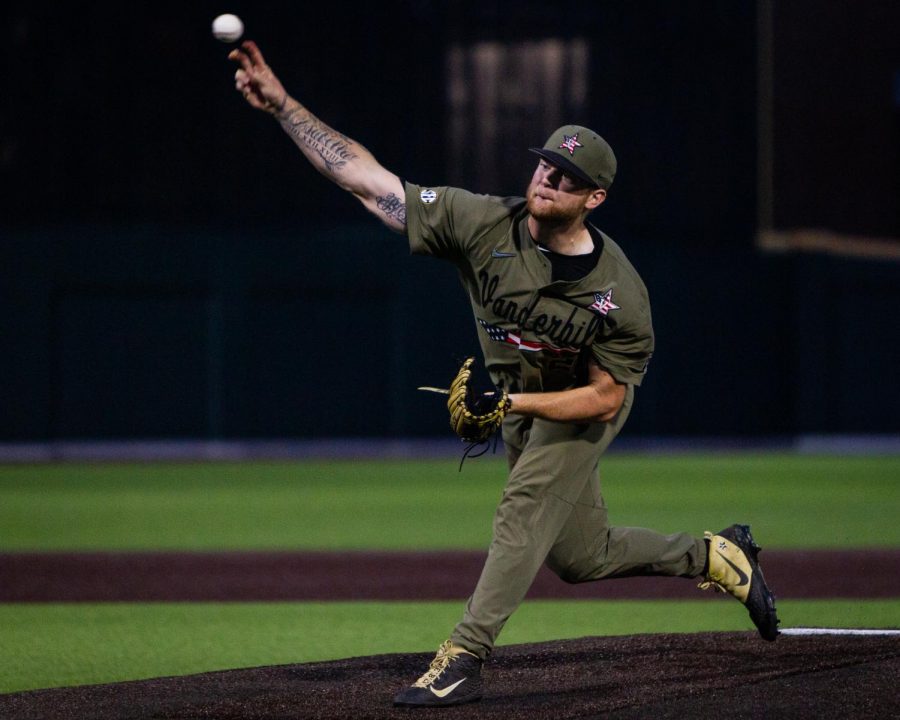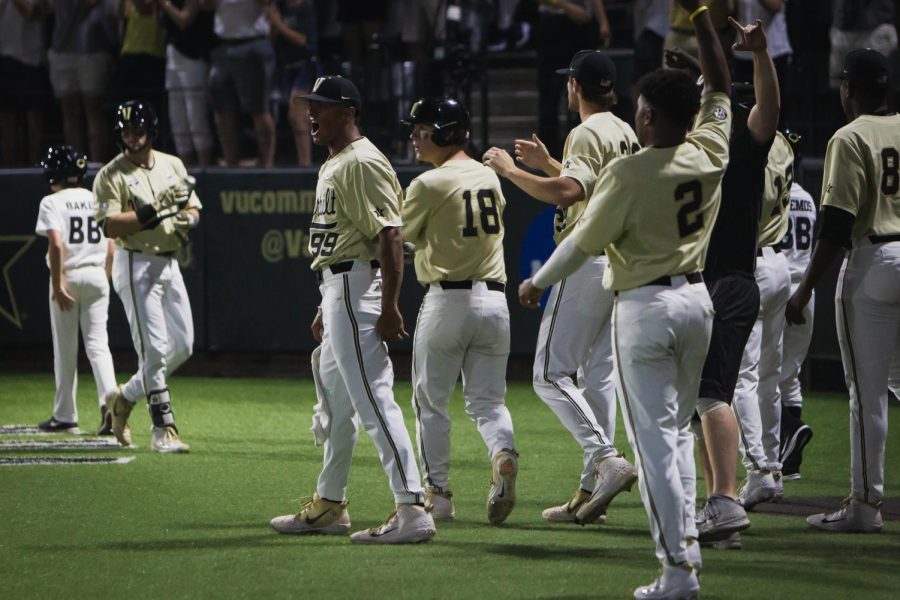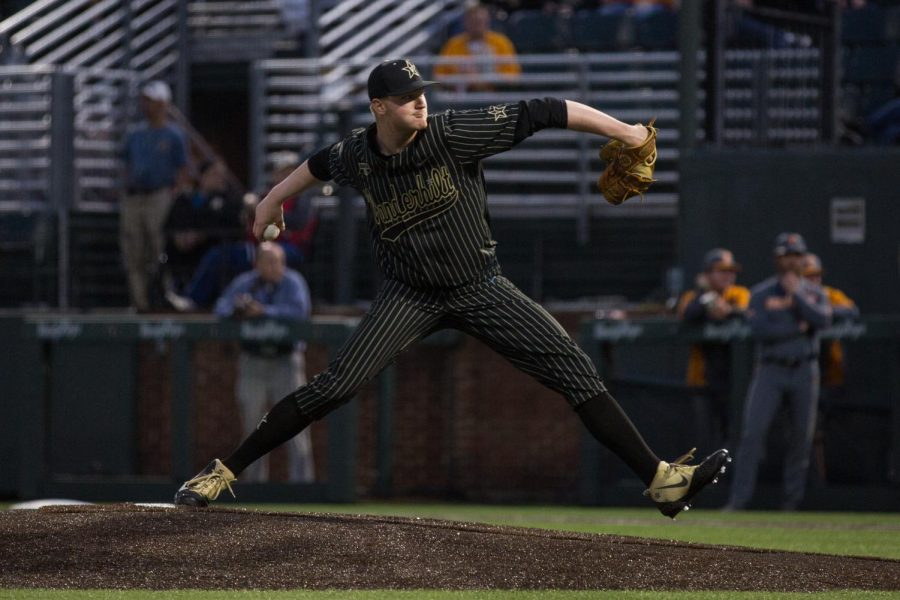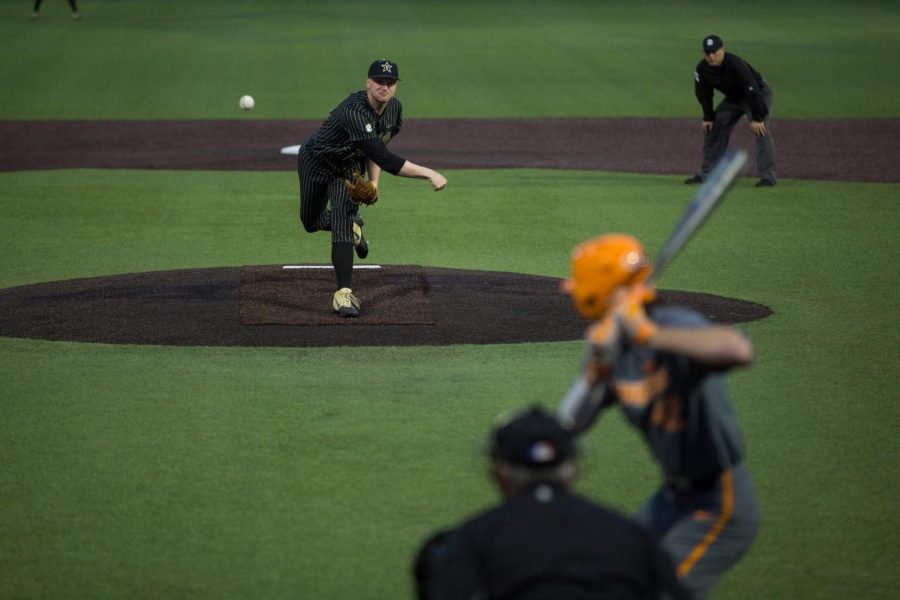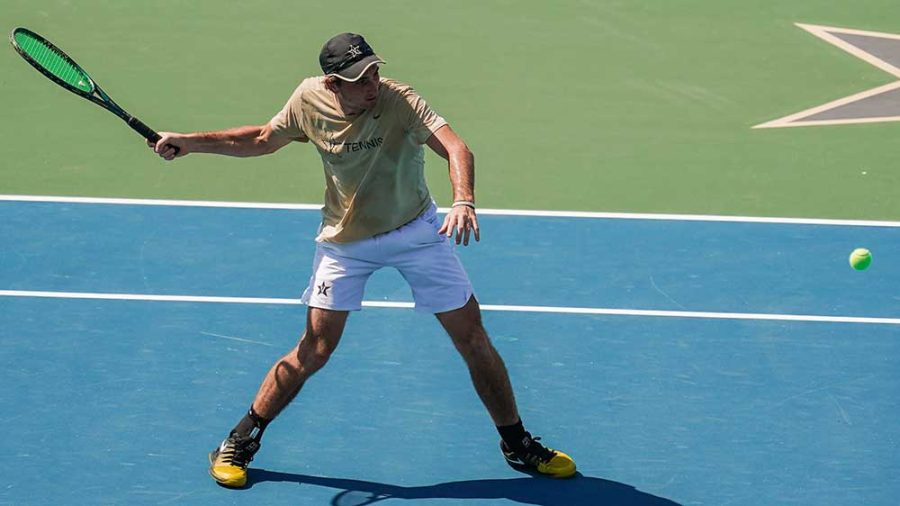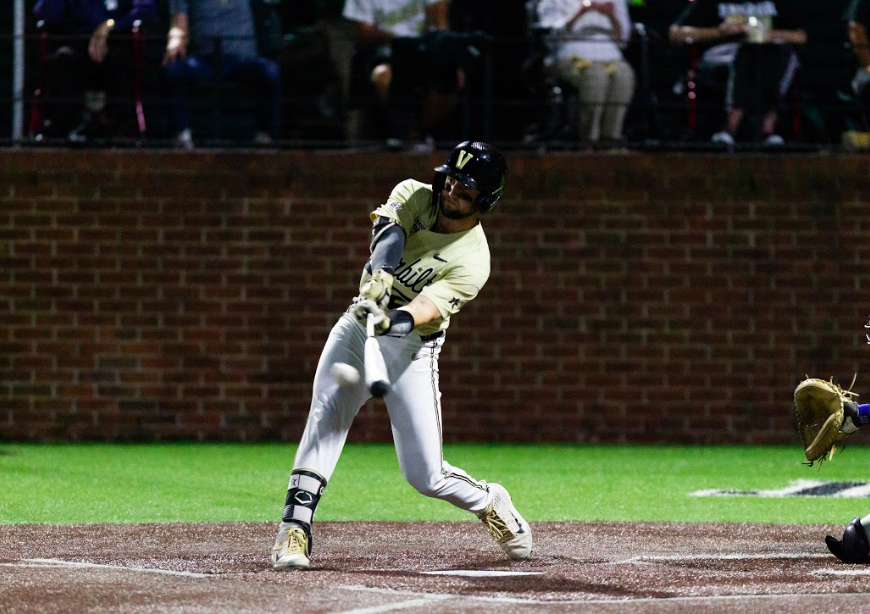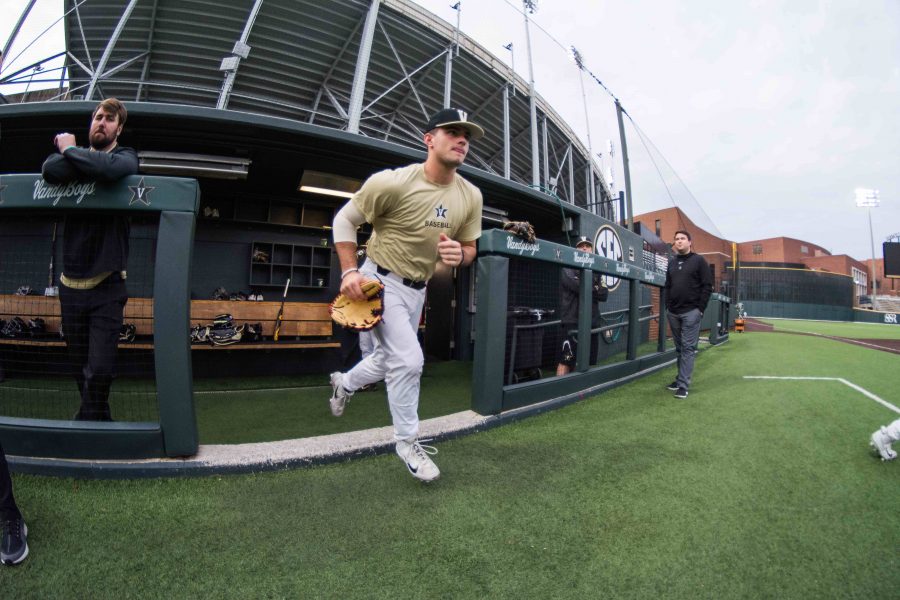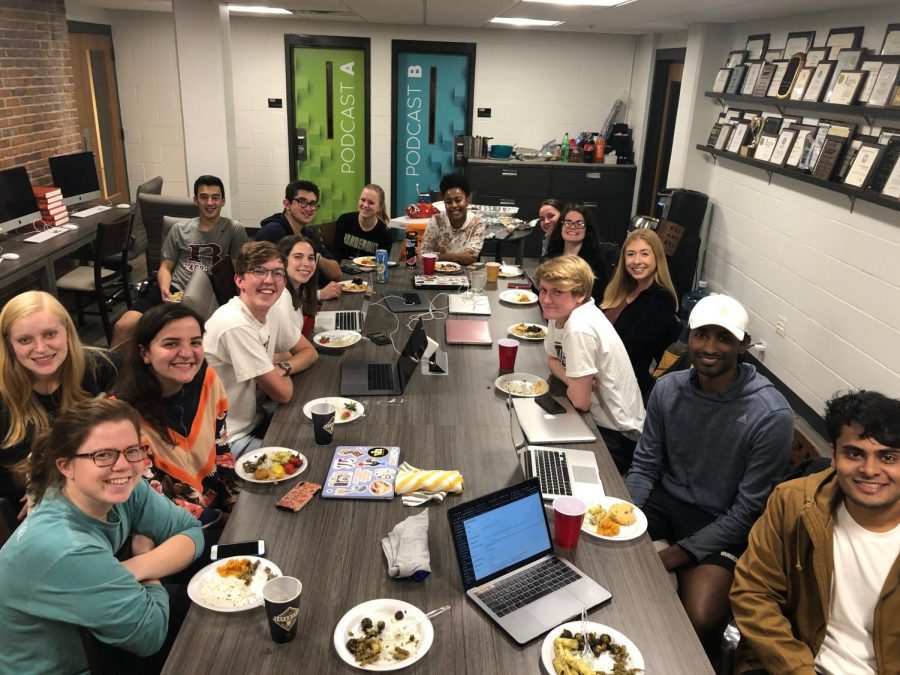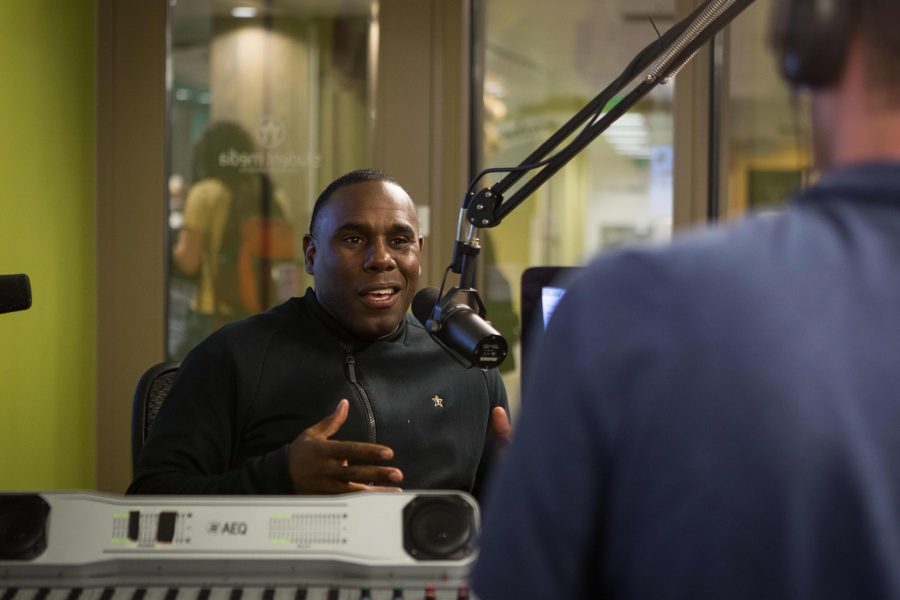The Commodores have touched down in Omaha.
After a Super Regional that featured a blowout loss, a home run barrage, and a historic 19-strikeout no-hitter, Vanderbilt sets its sites on a College World Series run. That quest begins Sunday afternoon in an opening matchup with #7 Louisville. The Commodores open the NCAA Tournament as the top-ranked team and the betting favorites to take home their first title since 2014.
The Vanderbilt Hustler will have live updates throughout the College World Series, but first, three Hustler sports reporters answer three important questions heading into Omaha in this edition of Three Up, Three Down.
Which Commodore are you keeping your eye on most this weekend?
Max Schneider, Sports Editor:
Drake Fellows. Without a doubt. It’s hard to overstate how important it is to remain in the winner’s bracket from a pitching standpoint, and Fellows will be tasked with getting the Commodores there right out of the gate. Fellows has shown he has ace stuff this season, and he has received enough hardware in the past week to prove it, including Second Team and Third Team All-American honors.
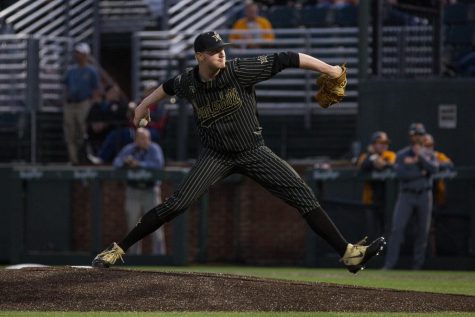
Drake Fellows will get the start on Sunday afternoon against Louisville.
The big question, though, is which version of Drake Fellows will we see on Sunday? Will it be the Drake Fellows that hurled six shutout innings against a top-five Mississippi State team and followed it up with a complete game his next start? Or will it be the Fellows that got knocked around for seven hits and five runs in just four innings of work against Duke? We’ve seen both versions of the 6’5 right-hander over his past six starts. Three have been excellent, and three have been disastrous. The Commodores will need the former from Fellows, especially since he will have to make as many as two starts before Vanderbilt would even reach the College World Series Finals.
Betsy Goodfriend, Deputy Sports Editor:
Stephen Scott is my player to watch in the College World Series. Legends are made in Omaha, and I think this is the week that Scott can elevate his legacy. Scott is a leader on this experienced team, and he’s started 63 games this year. His .339 batting average is third-best of the regular starters on the team, and he’s hit 12 home runs. I could see a few situations where Austin Martin and JJ Bleday are on base ahead of Scott, and he finds a way to score both of them to be the difference in a tight game. Or, he could blast a three-run homer with his powerful swing. TD Ameritrade Park’s dimensions are pretty similar to those of Hawkins Field, with the exception of left field, which is 20 feet longer in Omaha. Good thing Scott pulls home runs to right field in bunches.
Simon Gibbs, Deputy Sports Editor:
This Commodores roster is ridden with talent. Despite all the household, talented names, there is one player who doesn’t necessarily get the recognition he deserves: Tyler Brown.
I firmly believe Tyler Brown will play a key role for the Commodores in the coming games because, after all, it’s the postseason. More often than not, these games are going to be close. Corbin’s bullpen has to be locked and loaded, ready to come into high-pressure situations and close games. Brown, a first team All-American, will be heavily relied on throughout the next two weeks. He pitched one great inning in relief on Sunday, but given the Commodores’ substantial lead, there wasn’t too much to worry about. One appearance prior, however, things didn’t go too well for Brown. In the regionals, he allowed four runs (three earned) against Indiana State—nearly enough for them to tie the game in the bottom of the ninth. I’m confident Brown will bring his A-game come Omaha. That said, if his performance draws any parallels to the way he pitched against Indiana State, the Commodores could very well be eliminated from contention.
Looking at Vandy’s road to a CWS title, which team is most likely to give them trouble?
Schneider: The VandyBoys might be the favorites heading into Omaha, but they’re certainly not catching any breaks. A Sunday afternoon date with Reid Detmers (12-4, 2.85 ERA, 162 K’s) and Louisville is about as difficult as it gets to kick off their College World Series. So while the immediate answer to this question might be Mississippi State, and that’s likely the matchup Commodore fans are circling on the bracket, entertain me for a second, because Louisville is not a team to look past.
For starters, this is a team with College World Series experience. Dan McDonell’s group last qualified just two years ago, and six of his nine starters were members of that team. That veteran presence showed this year. Louisville swept series against Duke and NC State en route to a regular season ACC title, and swept ECU in the Super Regionals in blowout fashion, winning their two matchups by a combined score of 26-1.
Their non-conference schedule featured four SEC opponents, including two matchups against Ole Miss, two against Kentucky, and of course, one against Vanderbilt in the annual Battle of the Barrel. Louisville won all of those matchups except for the Vanderbilt game, but the Louisville team Vanderbilt played back in early May bears no resemblance to the one they’ll face on Sunday. That midweek matchup was essentially a bullpen game for the Cardinals – they trotted out nine different pitchers – a far cry from the left-handed sophomore that will try his luck this weekend. Detmers ranks second in the nation in strikeouts and will face a lineup that does tend to strike out in bunches at times.
On the flip side, the Cardinals are extremely adept at avoiding strikeouts and putting the ball in play, and they burn opposing teams with station-to-station baseball. Five Cardinals have 13 steals or more this season. Simply put, this is an experienced, well-rounded team with a legitimate ace at the helm. If Vanderbilt is going to get to the Finals, they’re going to have to go through Louisville once, twice, or maybe even three times.
Goodfriend: Mississippi State, without question. Ethan Small and the Bulldogs lost a tight pitcher’s duel to Vanderbilt back in the SEC Tournament. The only offense in the 1-0 game was Julian Infante’s RBI single in the second inning. Both Vanderbilt and Mississippi State have to win their first game to meet in the winner’s bracket or both lose to meet in the loser’s bracket. If Small starts the opening game against Auburn, Mississippi State has freshman pitcher J.T. Ginn to throw the next game. Ginn was the Dodgers’ first-round draft pick last year, but turned the Dodgers down to play in Starkville. He was named National Freshman Pitcher of the Year and a Freshman All-American by Baseball America and National Freshman of the Year by Perfect Game after limiting opposing batters to a .223 batting average over 80 innings of work. A freshman phenom who put off the pros for a few years to dominate SEC baseball – sound familiar?
Mississippi State’s offense is led by senior Jake Mangum and a pair of talented sophomores in Tanner Allen and Justin Foscue. The trio are the only Bulldogs to start every game this year, and each one has a batting average above .338. The only team in the country that can match Vanderbilt’s balanced team is Mississippi State, and the Commodores could have trouble beating the Bulldogs for a second time this postseason.
Gibbs: Mississippi State. This team is something else—or really, Ethan Small is something else. The All-American starter has been nothing short of elite for the Bulldogs this season. In just 102 innings pitched, he’s managed to post 168 strikeouts and keep his ERA as low as 1.76. Does Vanderbilt have a complete, well-rounded offensive attack? Yes. Will they be able to show it against Ethan Small? Well, if the third round of the SEC tournament told us anything, it’s that they might not.
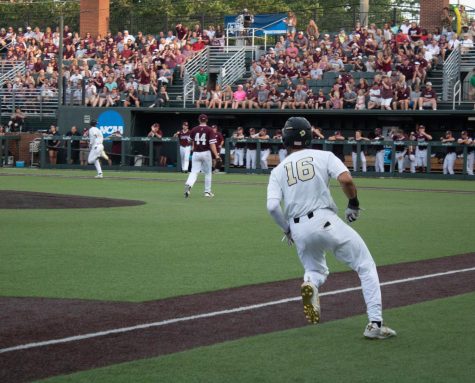
Mississippi State will look to knock Vanderbilt out of the NCAA Tournament for the second consecutive year.
This was a pitching duel for the ages; Vanderbilt’s Drake Fellows gave it his all, striking out eight over six innings. He was then given the best gift he could’ve asked for: three scoreless innings of relief pitching. Small dominated over seven innings, striking out eleven Commodores. Vanderbilt hardly snuck away with a 1-0 win after Julian Infante’s bloop single turned into the difference-maker.
In the postseason, there’s not even a guarantee that Vanderbilt can score that one run. Perhaps more worrisome is that Vanderbilt has no guarantee that any combination of pitchers can complete the game without letting up a run. The Mississippi State Bulldogs are going to be tough to get past in the World Series.
What does Vandy need to do to win in Omaha?
Schneider: It’s hard to find any glaring weaknesses with this Vanderbilt team. That’s part of why they’re the top-ranked team heading into Omaha. So if the Commodores are going to win it all, they’ll need to limit the big inning, and not let one mistake compound into four or five.
The offense can keep up with anyone. It’s probably the best offense in college baseball, but when one walk turns into four, or when a throwing error turns into a hard grounder through the legs on the next play, like it did against Ole Miss and Duke, that puts more and more pressure on the offense to shoulder the load and mount a major comeback. And while the Commodores were able to complete that comeback against Ole Miss, that isn’t a sustainable model for success.
Part of this will depend on Corbin to decide when to go to the bullpen and when to trust his starters. He’s done this well for most of the season, and that will be critical over the course of the next week or two. The pitching doesn’t have to be perfect, it just has to avoid the big inning and give the offense a chance, because the Vanderbilt bats can put up double-digit runs at a moment’s notice.
Goodfriend: No one is asking the pitching staff to throw another 19-strikeout no-hitter, though if Kumar Rocker has another one in him, no one would mind. The starting pitching needs to make it through at least six innings in every game in Omaha, and the longer they pitch, the better. The bullpen has been an issue all year save for Tyler Brown, but even he has had some uncharacteristically shaky performances this postseason.
Patrick Raby could potentially see some action from the bullpen if things go haywire early in a game, especially because three starters are usually sufficient for the College World Series. Jake Eder has stepped up as a long reliever, but the bullpen’s depth is pretty shallow. Being in the winner’s bracket should also help keep the bullpen, well, in the bullpen.
Gibbs: This team has shown some fight. They have yet to give up on any game, any series, or any challenge this season. The best microcosm of their season was the finals of the SEC tournament—their ability to come back against Ole Miss was unprecedented. They trailed 6-0 after one frame. There was no giving up, no moping, and certainly no lack of effort, as they rallied back to win 11-10 on a walk-off hit.
If Vanderbilt wants to win in Omaha, that same fight that they’ve shown all season must extend to the World Series.
The competition will be stiff, so Vanderbilt will inevitably face roadblocks, but they cannot show any signs of giving up. Furthermore, even if they drop one game, they would need to lose once more to be eliminated—if this situation ensues, they cannot play as if they had just lost a game. They need to play like the hottest team in baseball, with a will to win that surpasses all else. If this grit carries over to Omaha, this will be a dangerous team.

